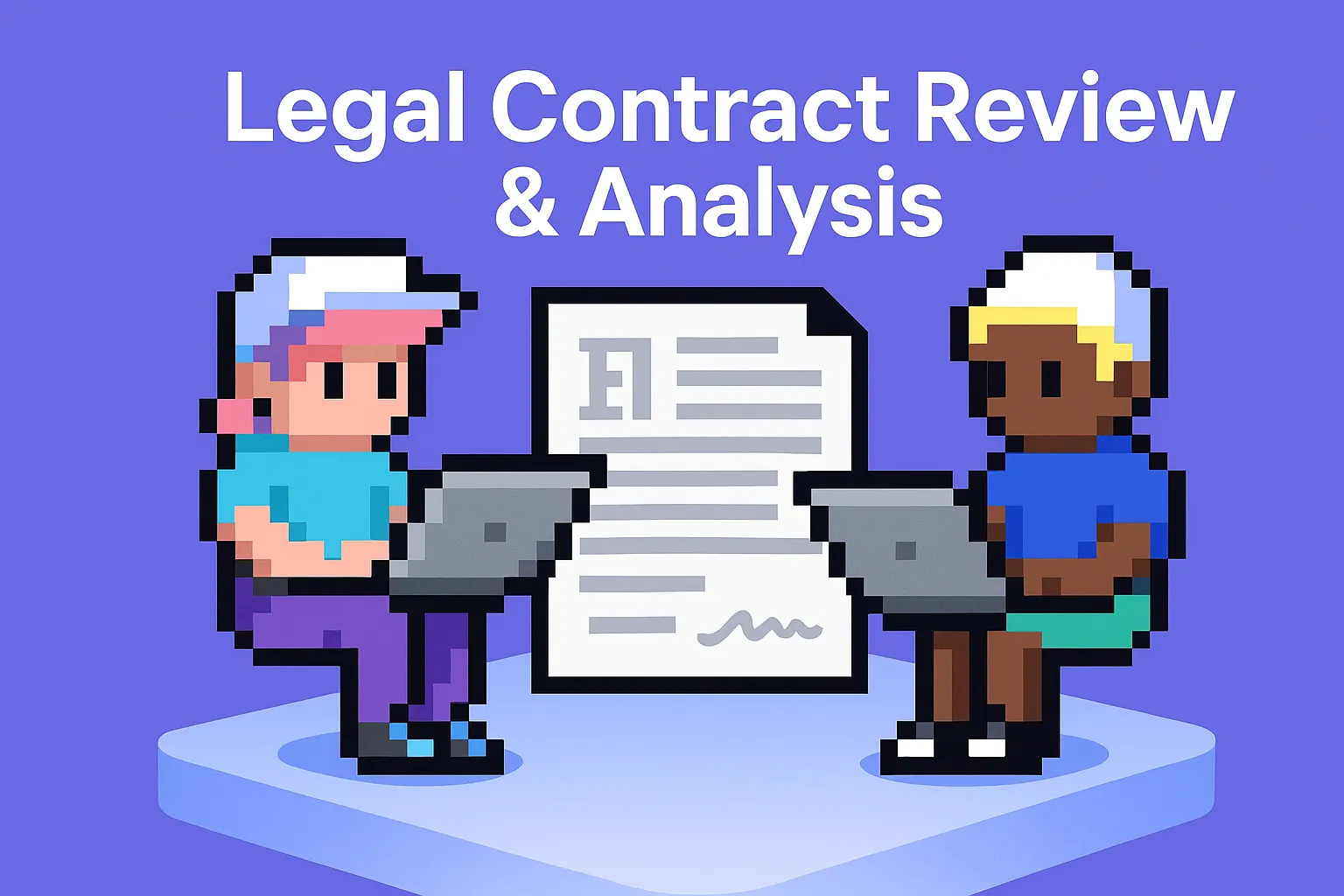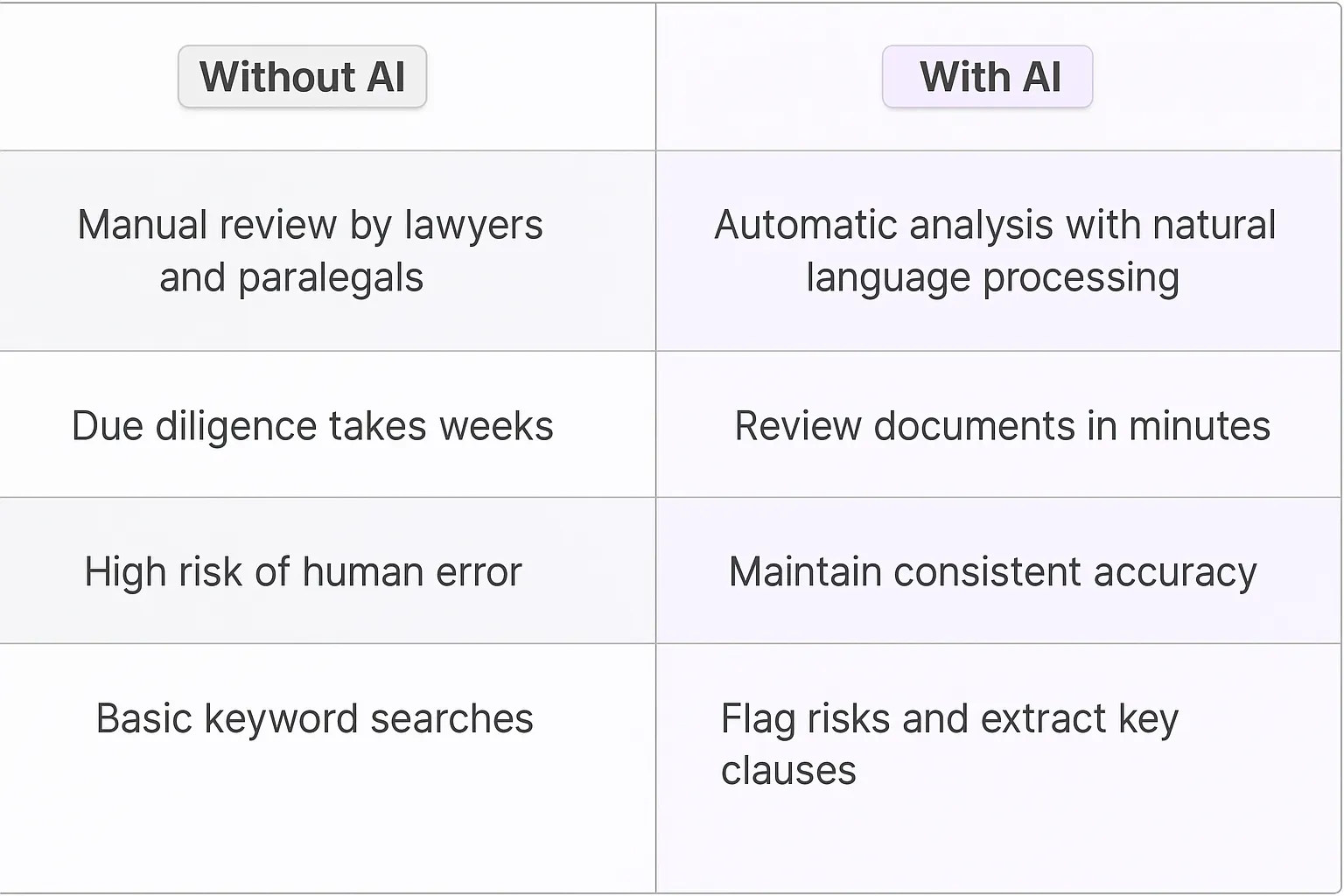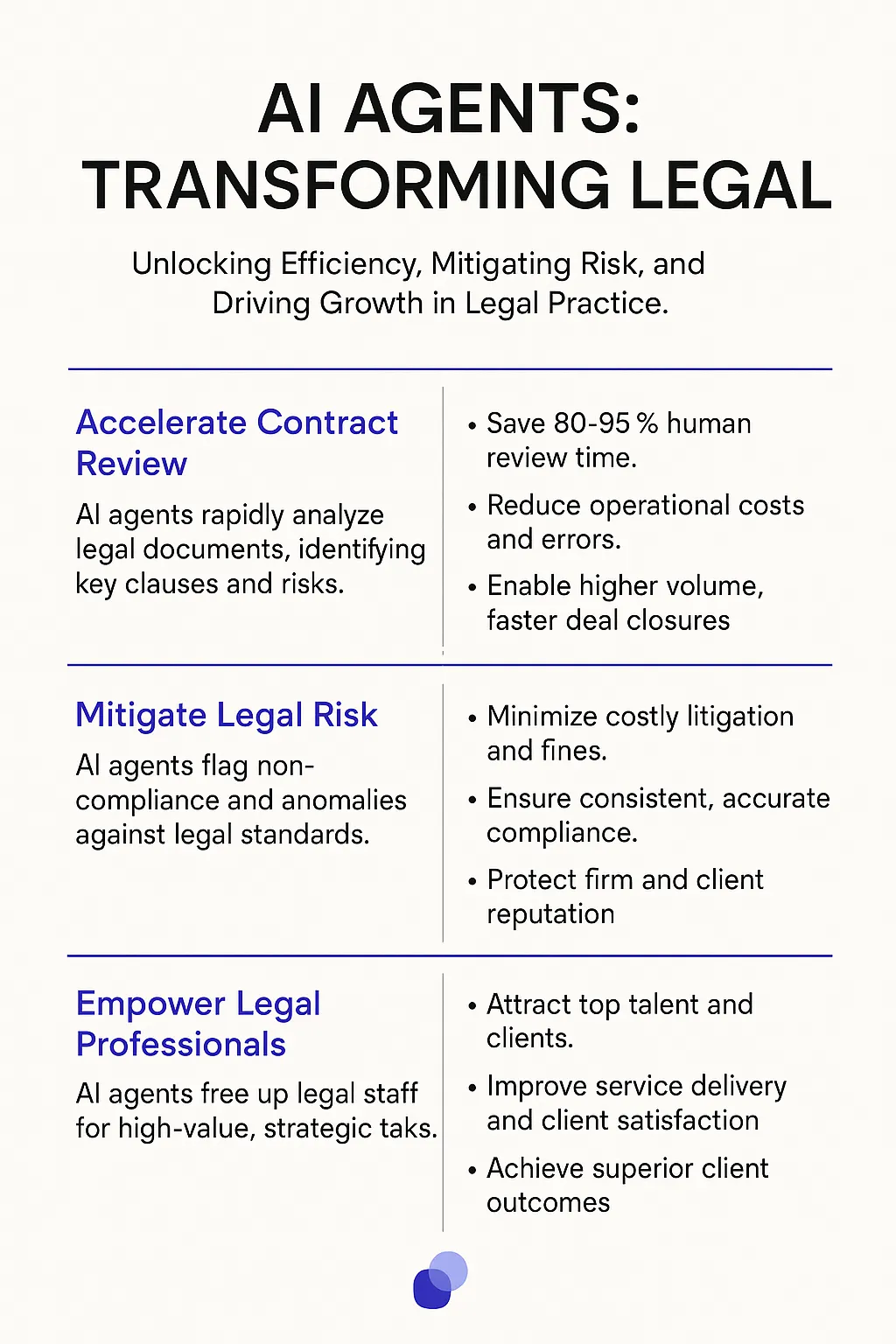Legal Contract Review and Analysis
Understanding AI-Powered Legal Contract Review and Analysis
What is Legal Contract Review and Analysis?
Legal Contract Review and Analysis is the process of examining legal documents to identify key terms, potential risks, and compliance issues. Traditionally, this has been a time-consuming manual task performed by lawyers and paralegals. With the advent of AI, this process is being transformed into a high-speed, high-accuracy operation that can handle vast volumes of complex legal documents.
Key Features of Legal Contract Review and Analysis
AI-powered Legal Contract Review and Analysis tools come packed with game-changing features. They can rapidly extract and categorize key clauses, flag potential risks, and even suggest improvements based on best practices. These systems can analyze thousands of documents in a fraction of the time it would take a human team, maintaining consistent accuracy even when dealing with complex legalese. They're also capable of learning from each review, continuously improving their performance and adapting to new legal landscapes.

Benefits of AI Agents for Legal Contract Review and Analysis
What would have been used before AI Agents?
Before AI agents entered the legal tech scene, contract review was a painstaking process that made even the most caffeinated lawyers want to cry into their case files. Junior associates and paralegals would spend countless hours poring over dense legalese, armed with nothing but their tired eyes, highlighters, and a prayer that they wouldn't miss any crucial details.
Law firms often relied on a combination of manual review, basic keyword searches, and template-based approaches. This method was about as efficient as trying to find a specific grain of sand on a beach - time-consuming, error-prone, and frankly, soul-crushing for the poor souls tasked with the job.
What are the benefits of AI Agents?
Enter AI agents for legal contract review and analysis - the digital teammates that are transforming the legal landscape faster than you can say "objection overruled." These AI-powered tools are like having a team of tireless, hyper-intelligent legal experts working 24/7, without the need for coffee breaks or vacation days.
First off, speed. AI agents can blaze through contracts at a pace that would make The Flash jealous. They can analyze hundreds of documents in the time it takes a human lawyer to finish their morning latte. This isn't just about being fast; it's about freeing up lawyers to focus on high-value tasks that actually require human creativity and judgment.
Accuracy is another game-changer. Unlike humans, AI agents don't get tired, distracted, or hangry. They maintain consistent performance, catching subtle details and potential issues that even the most eagle-eyed lawyer might miss after their fifteenth straight hour of review.
But here's where it gets really interesting: pattern recognition. AI agents can identify trends and inconsistencies across vast numbers of contracts, providing insights that would be practically impossible for humans to uncover manually. It's like having a legal savant with a photographic memory of every contract ever reviewed.
Customization is key. These digital teammates can be trained on a firm's specific requirements, precedents, and risk tolerances. They're not just generic tools; they become extensions of a firm's unique legal expertise and approach.
Finally, there's the cost factor. By dramatically reducing the time and manpower needed for contract review, AI agents can significantly lower costs for law firms and their clients. It's a win-win that allows firms to take on more work without burning out their staff or breaking the bank.
In essence, AI agents for legal contract review and analysis are not just incremental improvements - they're paradigm-shifting tools that are redefining what's possible in the legal industry. They're turning what was once a dreaded, time-consuming task into a strategic advantage for forward-thinking law firms. Welcome to the future of legal tech, where AI agents are the new power players in the game.

Potential Use Cases of AI Agents for Legal Contract Review and Analysis
Processes
Legal contract review and analysis is ripe for AI-driven transformation. These digital teammates can sift through mountains of legalese, spotting patterns and inconsistencies that even seasoned lawyers might miss. They're not replacing attorneys, but rather augmenting their capabilities in ways that could reshape the entire legal landscape.
Consider the due diligence process in mergers and acquisitions. Traditionally, this involves armies of junior associates poring over thousands of documents, burning the midnight oil for weeks on end. An AI agent could blaze through this work in a fraction of the time, flagging potential issues and summarizing key points. This isn't just about speed - it's about uncovering insights that might otherwise remain buried in the contractual fine print.
Another process ripe for AI enhancement is contract standardization. Large organizations often struggle with inconsistent language across their agreements, leading to potential vulnerabilities. An AI agent could analyze the entire contract corpus, identifying discrepancies and suggesting standardized clauses. This creates a more robust legal framework and reduces the risk of unfavorable terms slipping through the cracks.
Tasks
At a more granular level, AI agents can tackle specific tasks that traditionally eat up lawyers' valuable time. Take contract clause extraction, for instance. Instead of manually combing through documents to pull out relevant sections, an AI can instantly identify and categorize key clauses. This allows lawyers to focus on higher-level analysis and strategy, rather than getting bogged down in the weeds of document review.
Risk assessment is another task where AI agents could shine. By analyzing vast databases of legal precedents and outcomes, these digital teammates could provide probability-based insights on potential contract risks. Imagine a lawyer being able to instantly gauge the likelihood of a specific clause being challenged in court, or the potential financial impact of a particular term. This kind of data-driven decision support could fundamentally change how legal professionals approach contract negotiation and drafting.
Compliance checking is yet another area where AI agents could prove invaluable. As regulatory landscapes become increasingly complex, staying compliant across multiple jurisdictions is a Herculean task. An AI agent could continuously monitor contracts against current regulations, flagging potential issues and suggesting updates. This proactive approach to compliance could save organizations from costly legal headaches down the line.
The potential of AI in legal contract review and analysis is vast and largely untapped. As these digital teammates become more sophisticated, we're likely to see a seismic shift in how legal professionals work. The winners in this new landscape will be those who embrace these tools, using them to augment their human expertise and deliver unprecedented value to their clients.

Industry Use Cases: AI Agents Transforming Legal Contract Review
AI agents are reshaping the landscape of legal contract review and analysis, offering game-changing capabilities across various sectors. These digital teammates aren't just tools; they're becoming indispensable partners in the complex world of legal documentation. Let's dive into some industry-specific scenarios where AI is making waves:
In tech startups, AI agents are becoming the secret weapon for rapid growth. They're parsing through complex partnership agreements at lightning speed, flagging potential IP issues that could derail a product launch. For fintech companies, these AI powerhouses are dissecting intricate financial contracts, spotting regulatory landmines that human eyes might miss.
Real estate firms are leveraging AI to comb through lengthy lease agreements, identifying clauses that could impact property valuations or tenant rights. In healthcare, AI agents are proving invaluable in deciphering complex insurance contracts, ensuring hospitals don't leave money on the table due to overlooked clauses.
The entertainment industry is using AI to scrutinize talent contracts, catching royalty discrepancies that could save millions. Even in manufacturing, AI is revolutionizing supplier agreements, flagging potential supply chain risks buried in the fine print.
These aren't just efficiency plays; they're strategic advantages. AI agents are becoming the unsung heroes in legal departments across industries, turning contract review from a bottleneck into a competitive edge. The companies that harness this power effectively are the ones that will outpace their rivals in our increasingly complex business landscape.
Real Estate: Transforming Property Transactions with AI-Powered Contract Analysis
The real estate industry is ripe for disruption, and AI-powered contract review is the secret weapon that's about to change the game. Think about it: every property transaction involves a mountain of paperwork, from purchase agreements to lease contracts. It's a tedious, time-consuming process that's begging for innovation.
Enter the Legal Contract Review and Analysis AI Agent. This digital teammate is like having a seasoned real estate lawyer on speed dial, but one that never sleeps and can review contracts in minutes, not hours.
Here's where it gets interesting: these AI agents don't just skim the surface. They dive deep into the nuances of real estate law, spotting potential issues that even experienced humans might miss. They can flag unusual clauses, identify missing elements, and even suggest improvements based on best practices across thousands of similar contracts.
But the real magic happens when you combine this with market data. Imagine an AI that not only reviews your contract but also cross-references it with current market trends, recent comparable sales, and local regulations. It could tell you if that seemingly standard clause about property maintenance is actually out of line with local norms, potentially saving you from a costly dispute down the line.
For real estate agents and brokers, this technology is a game-changer. It allows them to handle a higher volume of transactions with greater confidence and less risk. They can focus on building relationships and closing deals, knowing that the AI has their back on the legal minutiae.
And for buyers and sellers? It levels the playing field. No more feeling overwhelmed by legal jargon or pressured to sign something you don't fully understand. The AI can provide clear, jargon-free explanations of contract terms, empowering everyday people to make informed decisions about one of the biggest investments of their lives.
This isn't just about efficiency; it's about transforming the entire real estate transaction process. It's about making property deals faster, safer, and more transparent for everyone involved. And that's the kind of innovation that doesn't just iterate on the existing system - it completely reinvents it.
Finance: AI-Driven Contract Analysis Reshaping Investment Banking
Investment banking is a high-stakes game where time is literally money, and the devil's in the details. Enter AI-powered contract review and analysis - it's not just a tool, it's a paradigm shift that's about to flip the script on how deals are done.
Think about the typical M&A process. You've got teams of junior analysts burning the midnight oil, poring over hundreds of pages of legal documents, trying to catch every nuance and potential risk. It's a necessary evil that's been accepted as part of the game. But what if it didn't have to be?
That's where these AI agents come in. They're not just faster - they're smarter, more consistent, and frankly, they don't get bleary-eyed at 3 AM. They can tear through complex financial contracts, shareholder agreements, and regulatory filings in minutes, flagging potential issues and inconsistencies that human eyes might miss.
But here's where it gets really interesting: these AI agents aren't just looking at the contracts in isolation. They're cross-referencing them with vast databases of financial regulations, market data, and historical deal information. They can spot trends and patterns that would take humans weeks to uncover.
For example, let's say you're working on a cross-border merger. The AI doesn't just check if the contract complies with current regulations - it can predict how potential regulatory changes might impact the deal down the line. It's like having a crystal ball for compliance.
This technology is also democratizing access to high-level financial expertise. Smaller firms and startups can now punch above their weight, leveraging AI to provide the kind of in-depth analysis that was once the exclusive domain of bulge bracket banks.
And for the big players? It's allowing them to take on more deals, move faster, and allocate their human capital more strategically. Instead of grinding through contracts, top analysts can focus on high-level strategy and relationship building - you know, the stuff that actually moves the needle.
But perhaps the most profound impact is on risk management. In a world where a single overlooked clause can lead to multi-million dollar losses, these AI agents are like a safety net with a Ph.D. They're not replacing human judgment, but they're making that judgment infinitely more informed and reliable.
This isn't just an incremental improvement - it's a fundamental reimagining of how financial deals are structured, analyzed, and executed. It's the kind of shift that doesn't just change the game; it changes the entire playing field. And for those who embrace it early? They're not just going to have an edge - they're going to redraw the map of the financial world.
Considerations
Technical Challenges
Implementing a Legal Contract Review and Analysis AI Agent isn't just about slapping some machine learning on a stack of PDFs. It's a complex dance of natural language processing, pattern recognition, and domain-specific knowledge that would make even the most seasoned engineers sweat.
First off, we're dealing with unstructured text data - the bane of many AI systems. Legal documents are notorious for their intricate language, nested clauses, and context-dependent meanings. Training an AI to parse this effectively is like teaching a robot to appreciate fine wine; it's possible, but it requires an incredibly nuanced approach.
Then there's the issue of keeping up with ever-changing legal landscapes. Laws and regulations evolve faster than tech sometimes, and our AI needs to stay current. This isn't just a one-time training job; it's an ongoing process that requires constant updates and refinements.
Let's not forget about accuracy. In the legal world, a single misinterpreted clause can lead to million-dollar mistakes. We're not aiming for 90% accuracy here - we need to be pushing the boundaries of what's possible in AI precision.
Operational Challenges
On the operational side, we're looking at a whole different set of hurdles. First up: data privacy and security. We're dealing with highly sensitive legal documents here. One data breach and we're not just losing customer trust, we're potentially facing legal action ourselves. The irony would be palpable.
Integration with existing legal workflows is another beast entirely. Law firms and legal departments have established processes that have been honed over decades. Dropping an AI system into this mix is like introducing a smartphone to a room full of carrier pigeons - there's bound to be some confusion and resistance.
Then there's the human factor. Lawyers aren't exactly known for their tech-savviness (no offense to any legal eagles reading this). Training them to effectively use and trust an AI system is going to require some serious change management skills. We're not just implementing tech here; we're shifting an entire professional culture.
Lastly, let's talk about scalability. As the system grows and learns, how do we ensure it can handle increasing volumes of contracts without sacrificing speed or accuracy? This isn't just about throwing more servers at the problem - it's about smart architecture and efficient algorithms that can grow with demand.
Implementing a Legal Contract Review and Analysis AI Agent is a complex undertaking, but the potential payoff is enormous. It's not just about efficiency; it's about unlocking new levels of insight and understanding in the legal field. For those willing to tackle these challenges head-on, the rewards could be game-changing.
AI-Driven Revolution in Legal Services
Legal Contract Review and Analysis AI Agents are more than just a technological upgrade - they're a paradigm shift in how legal work is done. By automating the tedious aspects of contract review, these digital teammates are freeing up lawyers to focus on strategic thinking and client relationships. They're democratizing access to high-level legal expertise, allowing smaller firms to compete with industry giants. As these AI systems continue to evolve, we're likely to see a fundamental reimagining of legal services, with AI-augmented lawyers delivering faster, more accurate, and more insightful work than ever before. The legal industry is on the cusp of a revolution, and AI-powered contract review is leading the charge.













